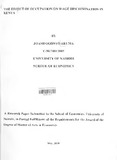| dc.contributor.author | Akuma, Joash Ogonyo | |
| dc.date.accessioned | 2012-11-13T12:30:04Z | |
| dc.date.available | 2012-11-13T12:30:04Z | |
| dc.date.issued | 2010 | |
| dc.identifier.uri | http://erepository.uonbi.ac.ke:8080/handle/123456789/3879 | |
| dc.description.abstract | This research paper examines the effect of occupation on wage discrimination in the Kenyan labour market using cross-sectional data from 1998/1999 labour force survey. The study examined whether occupational segregation exists in the labour market and assessed the effect of occupation variable on wage discrimination in the labour market in Kenya. Occupations have been classified into eight categories based on International Labour Organization's International Classification of Occupations (ISCO-88) framework.
The Duncan and Duncan Index of dissimilarity was used to measure the existence of occupational segregation. The computed value of 25.7% reveals that occupational segregation exists in the Kenyan labour market. This index is however, less than that observed in industrial countries such as Germany and United Kingdom with 40% and 33% respectively. Two separate equations were regressed for both the male and female wage equations using Ordinary Least Square (OLS). The regression was first run with occupation included in the model and with occupation excluded from the model. The results indicate that the value of R-squared was 46% and 55% for male and female respectively when occupation was included in the model while when the occupation variable was excluded; the Resquared value was 39% and 49% for male and female respectively.
Based on the findings, we can be conclude that occupation has an effect on wage discrimination since its inclusion in the regression gives a higher value of R - squared which decreases when he variable is excluded from the model. The results of the wage decomposition show that there is a wage gap between male and female. This is attributed to the human capital characteristics and the contribution of returns. The study recommends investment in instruments that reduce gender inequalities in access to education, choice of occupation and also policies aimed at promoting training programmes for both men and women. | en_US |
| dc.language.iso | en_US | en_US |
| dc.publisher | University of Nairobi, Kenya | en_US |
| dc.title | The effect of occupation on wage discrimination in Kenya | en_US |
| dc.title.alternative | Thesis (MA) | en_US |
| dc.type | Thesis | en_US |

